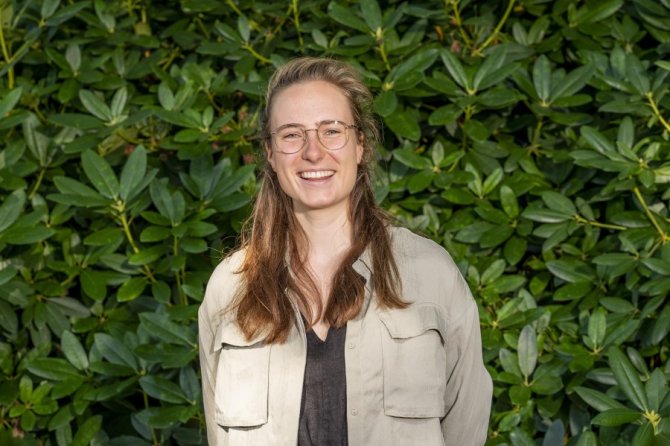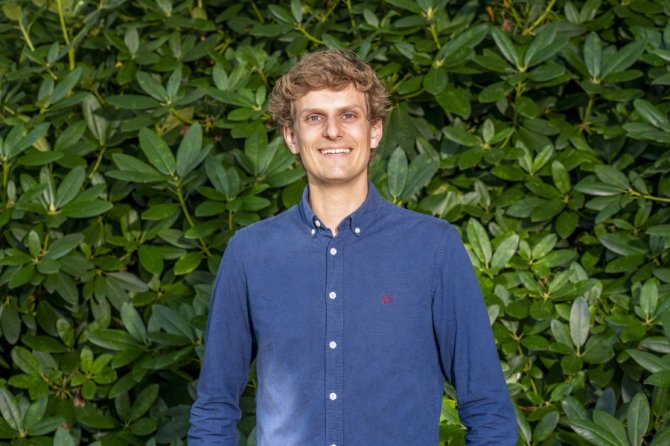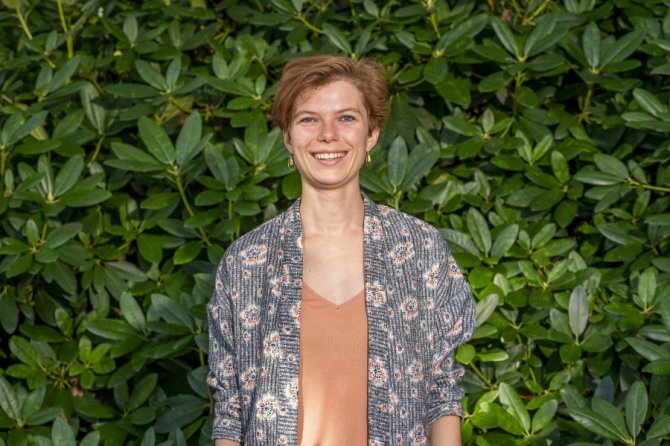
Interview
National ThinkTank: four Wageningers come up with practical solutions to biodiversity loss
Three WUR alumni and one Master’s student took part in the 2022 National ThinkTank. With the knowledge and experience from their own fields, these enthusiastic ambitious young thinkers and doers have come up with concrete solutions for a difficult societal problem: the biodiversity crisis in the Netherlands. They presented their solutions in a fine final report entitled ‘Biodiversity as a priority’.
Every year, the National ThinkTank Foundation organises a ThinkTank with 20 committed researchers from different study backgrounds to tackle a societal problem.
WUR alumni and student Fabian Timpen, Lina Dokter, Marnix van de Sande, and Laura van Bellen independently applied for the ThinkTank in 2022. They met during the selection day and discovered that they were all doing different studies. They all made it through the final selection, and so it came to be that no fewer than four Wageningers joined the ThinkTank team and worked intensively for four months in Amsterdam to analyse bottlenecks and devise solutions to a current societal problem. The 2022 theme was a real ‘Wageningen theme’, namely the biodiversity crisis in the Netherlands.
They share their story below, talking about it all began and what solution they worked on, but also what knowledge and experience their studies they were able to concretely use, and what participation in the ThinkTank has meant for their future.
-

Lina Dokter, MSc in climate studies
“During my studies, I learned a lot about how dramatic the situation is in terms of climate and environment. I felt a strong need not just to learn more and do more research on the issues, but to apply this knowledge by doing something concrete and devising solutions.
In the ThinkTank, you spar with each other about the research, or give each other feedback on solutions. I contributed most to the research and solutions for the construction sector, and the setting up of the two events organised by the ThinkTank.Solution: Urban nature in focus
Together with one of the other participants, I am currently working on establishing a public-private partnership called Stedelijke Natuur in Beeld (Urban Nature in Focus, SNiB). Our goal is to use applied research to find out to what extent nature-inclusive building measures increase biodiversity in the Netherlands.
I think I can safely say that I learned more skills during the four months of the ThinkTank than in the entire first year of my Master’s study programme. These are skills like result-oriented work and the use of multiple creative processes within your research. It has also given me many contacts within the business community and local and regional government agencies. I think what I valued most was the enthusiastic and motivated other participants I got to know, and the space for personal development that was available within this project.During my studies in Wageningen, we also worked extensively on interdisciplinary issues and mapping complex systems. I was also able to put my background knowledge of nature and climate to good use on issues surrounding the interaction between humans and the environment.
After the ThinkTank
At the moment, I am not looking for a job yet; I want to first complete my Master’s. Incidentally, I believe the ThinkTank will help me in my job search later on. By talking to many people from different organisations, such as consultancy agencies, foundations, and government agencies, I learned more about the specific kind of work people in these organisations do.
The ThinkTank has confirmed for me that I prefer working on applied social issues, rather than doing fundamental research. I plan to start working on my Master’s thesis at the end of March, and I want to apply in my thesis many of the things I learned during the ThinkTank, such as result-oriented working, applying creative elements in the process to lead to new insights, and asking for feedback on a regular basis.” -

Marnix van de Sande, MSc in earth and environment
“I’m interested in the interface between science and social issues, and I was keen to put into practice what I learned in my studies. With the theme of biodiversity, the ThinkTank nicely challenged me to approach an issue close to my heart in new ways. I was also looking forward to working with 20 driven young people from different study backgrounds.
During the ThinkTank, I focused mainly on the food chain, eventually working on a policy proposal to boost the organic sector in the Netherlands.Solution: Almost Bio
We have developed our solution as a policy proposal. Coincidentally, the Ministry of Agriculture, Nature and Food Quality launched its own Organic Farming Action Plan a week later. We see many similarities with our proposal, but also some missed opportunities, mainly in relation to the ongoing regional area processes. We are now trying to bring these to the Ministry’s attention.
I experienced the ThinkTank as an incredibly educational and fun time. What made is really exciting and instructive was working with all kinds of parties within the food system. At one of our events, I sat at a table with an ecologist and sustainable farmer, but also with representatives from a large supermarket chain and an animal feed company. I found it quite a challenge to moderate that conversation. I’ve also pushed my own boundaries in seeking publicity, for example by highlighting the benefits of organic farming in an interview with Trouw.In my studies, I learned a lot about the connections between different natural processes in a single system, for example how climate change affects ecosystem stability, and vice versa. I also learned to consider environmental issues from an economic perspective, which helps expose social dilemmas.
After the ThinkTank
I was fortunate to be offered a Ph.D. position in Wageningen soon after my studies. My experience at the ThinkTank made me realise that, in addition to the depth afforded by scientific research, I also find the link to social issues incredibly interesting. In the research project I am now embarking on, I want to flesh this out.
The applied nature of my studies helps with this, although I do think that contributing to a social debate is mainly something you learn outside the lecture hall.”
-

Laura van Bellen, MSc in organic agriculture
“The ThinkTank topic really appealed to me, and it also dovetailed well with my Master’s degree in Resilient Food and Farming Systems, which I had just completed. In the end, my participation in the ThinkTank was a great broadening, and at the same time a deepening of the subject, and I also acquired an awful lot of personal skills. It was a unique experience to work together with such a diverse and motivated group. It was also a different, more results-oriented way of doing research, and we also thought carefully about how to communicate our results well.
Solution: The Germ Collective
The solution I am working on is called The Germ Collective: A circular seed cooperative for farmers. Next year, we will run a pilot with five farmers who will each grow a different seedfast variety, following which we will harvest the seeds from these plants, process them, and redistribute them to the participating farmers.
This is where my study background comes in handy again, and this idea was born together with the network and support from the ThinkTank.”- Unfortunately, your cookie settings do not allow videos to be displayed. - check your settings
After the ThinkTank
Taking part in the ThinkTank has allowed me to develop many personal and professional skills, but I’ve also been able to think carefully about what energises me and where my talents lie. Right after the ThinkTank, I started working at DRIFT (Dutch Research Institute for Transitions), where I help organisations understand and steer major societal transitions towards a sustainable and equitable future, focusing mainly on agriculture and biodiversity.
There are many similarities between this work and what I did at the ThinkTank. I also work part-time on The Germ Collective, which also ties in nicely with my work at DRIFT.”
Meanwhile, the deed is signed. and the Germ Collective Foundation is now officially registered with the Chamber of Commerce and can further roll out its plans for the pilot. -

Fabian Timpen, MSc in biology
“My reason for signing up was the topic: the biodiversity crisis in the Netherlands. Thanks to my studies, I already had knowledge of the subject. The fact that the ThinkTank not only does research, but actually comes up with and implements solutions made me even more motivated.
Solution: Flying Ecologists
I’ve been busy researching the role of the government and its policies on biodiversity, and I’ve been working on a solution approach called Flying Ecologists, which aims at including free and paid knowledge sharing on nature/ecology in the built environment on the agenda.
Our initiative eventually became a policy proposal addressed to provincial governments. Some provinces are already doing well, and employ green experts who can visit lower-level government agencies, businesses, or schools. We figured out what makes these initiatives successful and passed this information along as advice to provinces where these projects have not yet taken off.
You learn to do research in a different way than in an academic study programme. You focus on a broader social context and draft both the hypotheses and the final answers with the help of experts from the field. You also learn to prioritise and work in groups, and develop new skills such as organising events. Besides, the group I ended up in felt very welcoming.
What was really useful to me from my studies was my knowledge of the functioning of ecosystems, the different types of Dutch ecosystems, and the nature policy and legislation of the past decades. This context was useful in formulating hypotheses and conducting interviews.
In my study programme, there was one mandatory subject, and for the rest, we were free to put together our own programme. This allowed us to make sure that our education matched the field we wanted to work in. However, it is important to think about this in time, be assertive, and ask people working in a sector you’d like to work in what skills and knowledge they consider to be essential. You can then pass this information on to your study adviser to work together to find relevant courses or work placements.After the ThinkTank
I learned to apply new methods and look at problems in a different way. In addition, I learned a great deal about the subject in a tremendously short period of time, not only in terms of content or research, but precisely in the broader social context. This is hugely important, especially if you’re interested in a job that is not purely academic.
By talking to many different companies, you get a good idea of the different forms of work, and make contacts that can help you in our job search. Actually, the ThinkTank itself is often your first full-time job. You discover what you personally find important in work and how you want to organise your work-life balance. I am now integrating all that information in my current job search.”
Final report 'Biodiversity as a priority'
The participants worked out 10 practical solutions to restore biodiversity in the Netherlands. These can be found in their final report ‘Biodiversity as a priority’ which was presented during the solution launch. The presentation took place 13 December 2022 in De Rode Hoed, in the presence of a large group of interested journalists, policymakers, people from innovation funds, and investors from Lidl, BAM, Natuurinclusief, and the Ministry of Infrastructure and Water Management. The presentation of the report was a success and formed a highlight of the whole project.
Marnix, Fabian, Lina and Laura will soon hand over the report in person to the president of the board of directors of Wageningen University & Research, dr. ir. Sjoukje Heimovaara.
Registration for the 2023 National ThinkTank is already open!
Bachelor’s and Master’s students, recent graduates, and Ph.D. graduates eager to use their talents and commitment to benefit society are invited to apply. Candidates must have the qualities required to move Dutch society forward with their smart and creative initiatives: the goal of the National ThinkTank.
Theme ‘Meaningful ageing’
Participants will join a team of young thinkers and doers and follow a full-time four-month programme in which they will research and devise solutions for the theme of Meaningful Ageing. Issues underlying this theme include the doubling of the number of older people in the Netherlands, society not being adequately equipped to cope with this, a shortage of workers and volunteers in the relevant sectors, and older people being a very heterogeneous group. Participants will work on subtopics such as preparing for ageing, purpose, labour market participation, and living environment.
- Information evenings on 22 and 27 March 2023
- Applications can be made from to 3 April 2023
- NTT'23 takes place from 14 August to 15 December 2023
- For all nationalities, speaking fluent Dutch is a requirement
- Website National ThinkTank